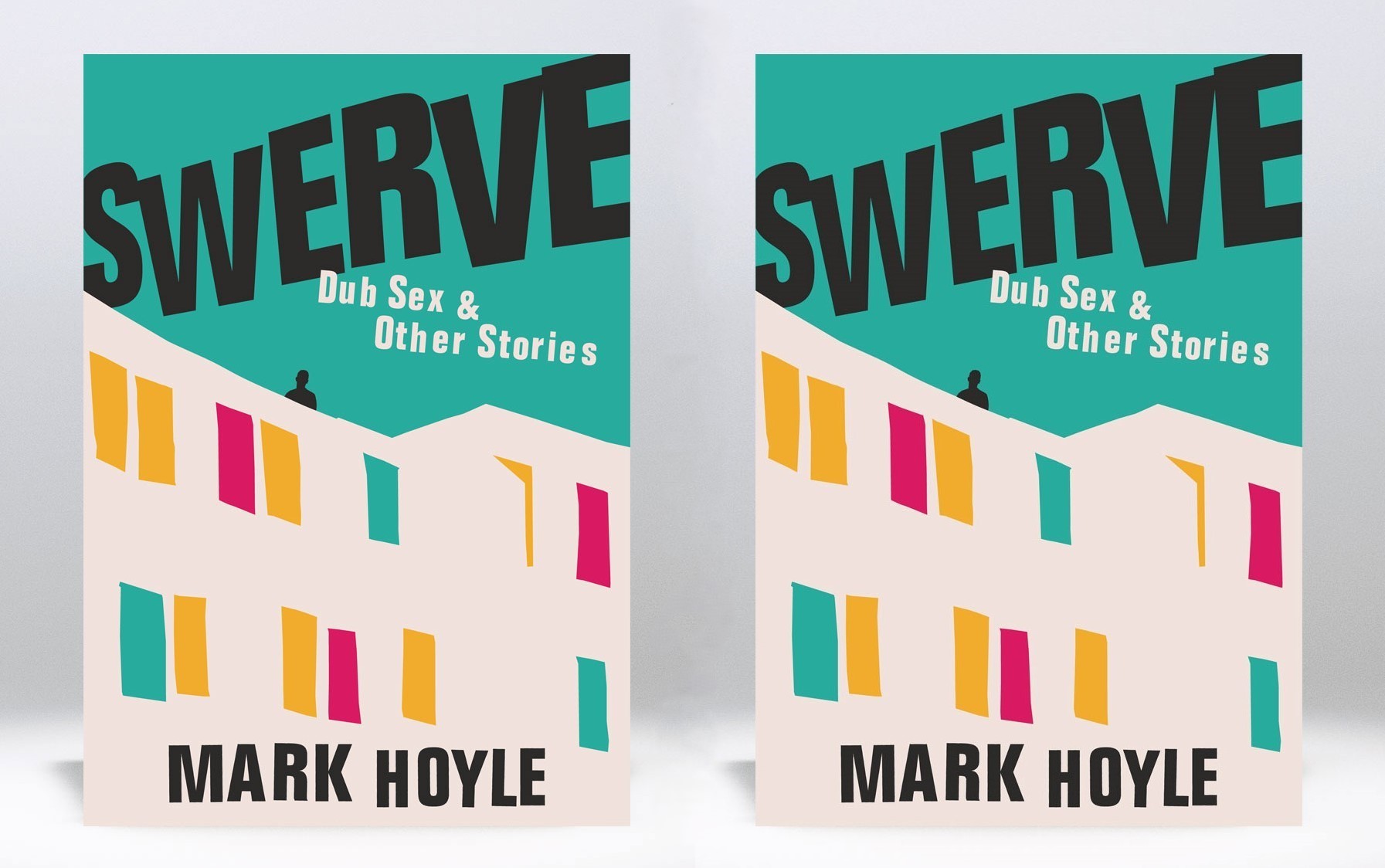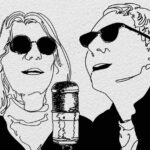
Mark Hoyle, frontman of cult Manchester band Dub Sex, opens up about his life, his music, and his experiences growing up in the Manchester music scene. Mark talks to Jason Barnard about overcoming a tough childhood, how punk rock became his escape, and the role John Peel and Tony Wilson played in shaping his career. His story is told in his new memoir Swerve, which describes into his life with unflinching honesty.
Your mother’s death at a young age had a profound impact on you. Can you share more about how that loss drove you to find a new family within the Manchester music community after you went into care?
My mother, Patricia Hoyle, was the bravest, most selfless person I could ever imagine. She was given two years to live in 1967, when I was only five years old, and she rose to the situation heroically. She made it her life’s work to spend every waking moment with me, teaching me to read and to be a self-contained person, happy with my own company. I immersed myself in books and music. She gave me the tools to express myself, and it was this, the most profound of her many gifts, that led me to make music, which in turn, led me to find a spiritual home in the world of music and musicians.
Escaping the care system when I did meant I was released into a world where things were changing fast. Punk brought with it a sense of equality and a feeling that ‘anybody can do anything’, and after such a challenging childhood, I jumped in with both feet. I was barely sixteen when I got involved with the Manchester Musicians’ Collective and the wider Manchester music scene. I think that my extreme upbringing brought out the best in people, a protectiveness, almost. Without my mother pointing me in this direction, I wouldn’t have been part of this world.
The punk scene in Manchester was known for its raw energy. How did your early exposure to it influence you?
When the germs of punk started to infect music and society in general, I was already completely music-obsessed. Reading about it, thinking about it, dreaming of being involved with it. Everything. I was lucky enough to be able to go to Middleton Civic Hall when punk gigs started in earnest in 1977. This small satellite town, five miles to the north-east of Manchester, was blessed with a series of gigs that served to ‘switch on’ its young inhabitants, many of whom went on to form bands themselves. Groups like The Chameleons, The Mock Turtles and The Wedding Present, as well as myself, were all exposed to the best of the new breed. The Damned, The Adverts, The Jam, Buzzcocks, The Ruts, X-Ray Spex, Misty In Roots, John Foxx’s Ultravox, XTC and many more played Middleton, with tickets priced at a pocket-money sized £1.00! We were spoiled rotten, to be honest.
You speak about various figures in Manchester’s music scene who became lifelong friends. Can you tell us about some of the people who had the biggest impact on you?
After a childhood in some of the roughest foster care placements and children’s homes, the exposure to decent, encouraging people was a breath of fresh air to me. I can point to the Coogan family, one of whom, Martin, was in my first band, Vibrant Thigh. Martin’s parents fostered children themselves, and were deemed ‘safe’ people for me to be around. This led to slightly more freedom, allowing me to be a part of Manchester’s growing music scene.
I was a very early Fall fan, and meeting their drummer, Karl Burns, was a huge turning point. From the off, he saw the worth in me, and encouragement like this, from a musician I respected so much, went a long way towards me believing in myself and taking things forward.
Your memoir also details your time as a member of the Manchester Musicians’ Collective. What was that experience like, and how did they support you?
The Collective changed everything. It was an organisation built upon fierce egalitarian principles, a place where musicians of every type were equal and would help each other out. They also put on regular gigs at Manchester’s Band On The Wall, which gave a first taste of performance to many musicians, myself included. As a wide-eyed sixteen year-old, being taken seriously by experienced musicians like Louise Alderman or Dick Witts (who was a Halle Orchestra percussionist and Granada TV presenter at the time) meant everything to me.
I became involved with the Collective at exactly the right time. Within a few short months I was included on A Manchester Collection, the first Musicians’ Collective album. This was proof positive to me of the punk belief that anyone could do anything, and gave me the confidence to take my music everywhere.
Dub Sex was hailed by Tony Wilson and John Peel early on. How did their backing impact the trajectory of the band, especially with the success of your debut single ‘Tripwire!’?
Tony Wilson was a massive part of any punk’s life. I played The Factory with Vibrant Thigh, and worked for him in the Haçienda when it first opened. Music-wise, he always encouraged me, and gave Dub Sex their first national TV exposure on his The Other Side Of Midnight programme. Dub Sex went on to play the Haçienda many times. I went from collecting glasses and working behind the bar to headlining the place!
John Peel, of course, is one of the defining figures of UK musical culture. As a teenage punk, I would soak up every note of his programmes, becoming educated along the way about reggae, African music, blues, and even world politics, along with thousands of others, both in the UK and further afield.
John played Dub Sex’s first release, ‘Tripwire!’ which was on a flexidisc given away free with Debris magazine. Being on a Debris flexidisc was a fast-track to get on his show. After he played it he said he wanted to have us in for a session. In all, we recorded four sessions for the John Peel show. This exposure led to everything – records, gigs, friendships, and a sense of self-worth. His involvement changed my life, and I won’t be the only person to say such a thing.
How did the live format of Peel sessions shape the sound of Dub Sex, and do you think it helped capture the essence of the band’s live energy?
Dub Sex were ideally suited to the John Peel session format. We were tight and well-rehearsed, and humble enough for the sense of occasion and the historic surroundings to have a real effect on us. Producer Dale Griffin had been the drummer in my childhood heroes, Mott The Hoople, which added another layer of excitement and weirdness to things, and his crisp, powerful production took everything up a level.
Though your single ‘Swerve’ made it into John Peel’s Festive Fifty, your last single ‘Time of Life’ didn’t gain the same traction. Was that a reflection of how the Madchester scene sidelined your music?
‘Swerve’ is a timeless record. It speaks of an optimism and upfulness that would apply to any period in history, and sounds as fresh today as it ever did. It also benefitted from better distribution and press attention than its follow-up, ‘Time of Life’.
It is sometimes said that we were somewhat ‘apart’ from other Manchester bands of the time, and there is some truth in that. We always mined a harder, rockier seam, and were less reliant on image than our contemporaries. That said, we were part of the same world, and played some great gigs with the likes of Happy Mondays and The Stone Roses. We were a realist band working in escapist times, and success or not, I am very proud of that.
You describe your memoir Swerve as being both open and powerfully optimistic despite the hardships. How did you maintain that sense of optimism throughout your life?
On the face of it, my life has been excessively hard and trauma-filled, to the extent of having everything destroyed when I was only a child. In a strange way, this wiping out of everything created a blank canvas for me, and the influence of my mother (and other good people) led me to see the best in people, a gift that I am eternally grateful for. I take a great deal of pride that I have been able to rise above the destructive elements in my life, and this continues to this day, where despite everything, I enjoy a rich family life, and am still creating great music, about real things.
What are your current projects and plans for the next year?
I am currently working on an album with my newest project, SPIRIT:level. SPIRIT:level is a collaboration with my film-maker and musician colleague, Wark. It’s soulful and eerie, human and hard-hitting electronica. We have mainly performed in art galleries, but may expand into other types of venue when the album is released. Watch this space. I will also be continuing my life story with a follow-up to Swerve, and have started the long process of organising my thoughts about that.
What do you hope those reading Swerve will take away? Is there a message you want to leave them with?
There are many messages to be taken from my book. It is a hugely optimistic story of the humanisation of a lost child, through the redemptive powers of music and art. I’ll leave you with some lyrics from the song ‘Swerve’, which sum things up nicely…
Swerve, or get hurt,
The choice is yours,
Grown up in the dirt you learned what I learned.
And in this battle of nerves,
They can hurt, but never come first.
Search for the right words,
Search for the missing words,
Swerve.
Further information
Swerve: Dub Sex & Other Stories by Mark Hoyle is available through Route Publishing. The book is exclusively available from this website until it goes on general release on 14 November 2024.




